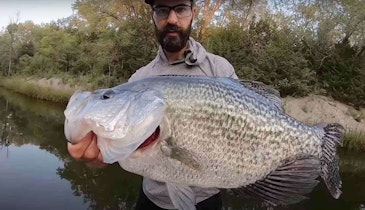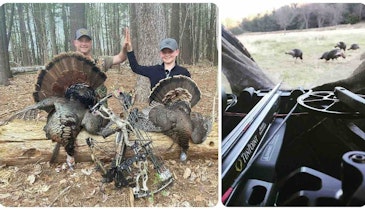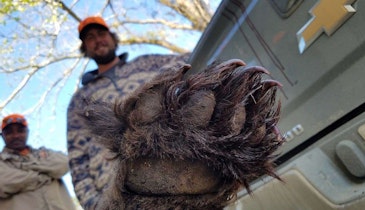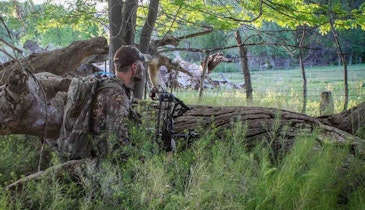November 4, 2015, was almost a day of disaster for black bear hunters in Maine – and across the United States. Fortunately, by a 52.7 - 47.3 percent margin, the state’s voters defeated a referendum that would have outlawed baiting, trapping and the use of hounds when hunting black bears. In 2004, Mainers also had to successfully defend bear baiting at the ballot box.
I don’t have to describe the two sides debating the issue, do I? Sportsman’s groups, led by the Sportsman’s Alliance of Maine but also with national support, campaigned vigorously against the measure. Mainers For Fair Bear Hunting (MFFBH), with the support of national anti-hunting megagroups like the Humane Society of the United States (HSUS), mounted the opposition campaign. Both sides received the bulk of their support money from outside Maine. MFFBH raised more than $2 million, with just $59,717 of it coming from Maine donors, according to the Maine Commission on Governmental Ethics and Election Practices. And guess what? Some 97 percent of their donations came from the HSUS, based in Washington, D.C. Sportsman’s groups raised $2.8 million to oppose the measure, with 39 percent of the money coming from Maine and 61 percent from at least 41 other states, according to campaign finance records.
Bear baiting has been under anti-hunter attack for decades. From 1992-96 voters banned baiting and hound hunting in Colorado, Massachusetts, Washington and Oregon, with predictable results. Afterwards all four states experienced a sharp rise in nuisance bear complaints, an increase in the number of nuisance bears killed by the government and an increased cost to the public as a result. In the August 24, 2014, Portland Press Herald, Wayne MacCallum, director of the Massachusetts Department of Fish and Game’s Division of Fisheries and Wildlife, was quoted as saying, “Every year now there are an increasing number of juvenile bears in metropolitan Boston. I suspect if we can’t harvest significantly more, the population will continue to increase. There are constant complaints about bear encounters. We are constantly moving bears. It’s kind of like shoveling sand against the tide. This is the largest bear population in the state for at least 200 years. The fact of the matter is, at some point, you will just have so many bears that people won’t tolerate them.” The other three states face similar problems.
In Maine, bait, hounds and traps account for 93 percent of the annual bear harvest. Maine is the most forested state in the country, and still-hunting for bears is extremely difficult. On the flip side, had the referendum passed, Maine has very few options to increase participation by bear hunters. The state already has a 14-week hunting season that starts in late August and ends after bears have entered their dens. Bear hunting licenses are already available in unlimited numbers, and a spring hunting season is prohibited by law. During the firearms deer season all Maine residents are already allowed to hunt bears without having to purchase a separate bear license. There are also fewer than a dozen “nuisance” bears killed annually in the state.
Currently, baiting black bears for the purpose of hunting is allowed in 23 of the 32 states in which bear hunting is permitted. In Maine, approximately 30,000 black bears roam the state’s 42,905 square miles – and the population is growing. Hunters kill between 3,000-4,500 bears annually, a number state officials say must be maintained to avoid more bear/human conflicts. Both bear guides and biologists are adamant that baiting is by far the best way to achieve this goal. And while animal rights groups claim baiting is “unethical,” the real goal of that bunch is the elimination of all hunting. They see baiting as both low-hanging fruit, to be picked off first before they attack other hunting disciplines, and an easy way to raise gobs of cash.
I love bear baiting. When I lived in Alaska I baited every spring, and I can tell you it is hard and time-consuming work, and there is no guarantee of success. Just last August I hunted over bait in Maine with legendary bear guide Wayne Bosowicz of Foggy Mountain Guide Service, a man who has been doing it here for more than 50 years. “No baiting and I, like most other bear guides in Maine, are out of business,” he told me. “Your chances of killing a bear sneaking around the thick forest here are about the same as winning the lottery.” On our hunt, the four bowhunters in my party never got a shot at a bear, thanks to unseasonably hot weather that had them hitting the baits after dark. Who says it’s a slam dunk? That said, Bosowicz’ hunters’ annual success rate is extremely high, and I will be back in his camp this fall.
To the anti-hunting crowd, bear baiting is the lazy man’s way to kill bears. Just throw down some old doughnuts, and voila! Kill a bear, just like that. For bowhunters, hunting over bait is by far the most practical way for an archer to get a close-range, ethical shot. It’s a lot like hunting deer over a food plot. It is also a great way to be very selective in the bears you shoot. I have spent many an entertaining evening in a stand watching sows and cubs work over bait. And if it was such a sure thing, outfitters like Bosowicz would sell single-day hunts, not those that last nearly a week.
The Maine referendum is not the end of the “Bear Wars,” simply a continuation of a conflict between hunters and the antis that will never end. It’s a stark reminder that if we want to continue to enjoy our way of life, like it or not we will all need to become more involved in the politics.






